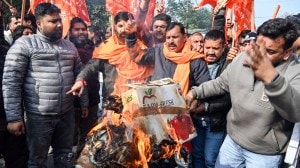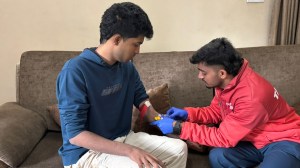Michel equaliser helps Germany clinch Test series
AMRITSAR, Jan 9: Experiment' was the keynote as India and Germany thrashed out a 1-1 draw in the third Test of the four-match hockey series...

AMRITSAR, Jan 9: Experiment8217; was the keynote as India and Germany thrashed out a 1-1 draw in the third Test of the four-match hockey series at the Guru Nanak Dev University turf here today.
Having lost the earlier two Tests Chennai and Bangalore, one would have expected the Indians to go all out for victory here. But coach Baskaran surprised everyone by starting with Dhanraj Pillay as outside-left and bringing in Rajiv Mishra as the centre-forward.
Mishra, playing his first match in the series, looked a bit jaded and unsure, yet showcased his shooting prowess by sending India ahead in the 24th minute of the first half.
However, Germany equalised when Bjorn Michel struck just before the half time hooter.
Baskaran tried out fresh strategies, as he brought back Dhanraj in the second session as a withdrawn left-in, leaving Mishra and Mukesh Kumar as twin strikers upfront. 8220;With Dhanraj being shadowed8217; all through, I wanted Mishra and Mukesh to play freely,8221; he said later.
While this move surprisedGermany, as their midfielders scurried back to lend support to the strained defenders, it was apparent that the visitors took it easy in the second half, attacking on rare occasions. The wily coach Paul Lissek indeed preferred to strengthen the defence to hold on to the draw, and claim the series.
This is not to say that the Germans did not test the Indian defenders. As in Bangalore, Dilip Tirkey and Lazarus Barla were sure and solid. Goalkeeper Jagdish Ponappa also had a good outing, showing good anticipation to deny Germany, who earned four penalty corners. It was just a lapse in concentration on the part of Barla that gave Germans the equaliser.
A heartening aspect was the flourish with which Thirumalvalavan took the burden of a play-maker. And with Tirkey and Barla making deft interceptions to launch into counter-attacks, Indian midfield had a healthy look to it. Ramandeep Singh, who started as centre-half, went back to his usual half position, after he struggled to feed his forwards.
Germany laid special emphasis on defence, having at a time four men guarding the citadel. Their swift counter-attacks were less on display, as Indians bottled their midfielders on several occasions.
The only worrying factor for Baskaran should be the inability to earn penalty corners 8212; the hosts failed to earn even one. However, as Baskaran explained later, the strategy was to get field goals through constant attacks.
Indians did miss a couple of clear chances 8212; Mukesh in the first half and Mishra in the dying minutes 8212; but the forwardline showed a lot of cohesion, even when Baskaran kept making frequent changes in the second half.
The Indian goal was set up by Baljit Singh Chandi from the right. Sameer Dad latched on to his cross and took a shot which was padded away by goalkeeper Nils Kowalczek. Mishra pounced on the rebound to flick it home.
The German goal was the handiwork of captain Christian Blunck. He took a cracking hit from top of the circle on a pass from Christian Eimer. Ponappa palmed away the threat, but Bjorn Michel grabbed the rebound into the net. Baskaran expressed the hope that with his team making steady progress, 8220;victory at Delhi was very much on the cards.8221;
- 01
- 02
- 03
- 04
- 05































